This is an old revision of this page, as edited by 222.152.72.134 (talk) at 02:36, 26 August 2006. The present address (URL) is a permanent link to this revision, which may differ significantly from the current revision.
Revision as of 02:36, 26 August 2006 by 222.152.72.134 (talk)(diff) ← Previous revision | Latest revision (diff) | Newer revision → (diff) For other uses, see World (disambiguation).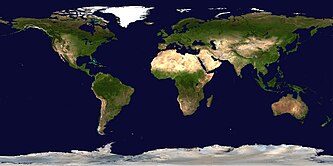

World is primarily referring to planet Earth, especially when capitalized the World. Unlike the term "earth", "world" (like the term international and the adjective of globe, global) is used in combination with the core topics describing our world society or world community.
Origin and history of the name
In English, world is rooted in a compound of the obsolete words were, man, and eld, age; thus, its oldest meaning is "age or life of man".
History
Main article: History of the worldThe history of the world is a reference to human history, which is thought to begin 3 mya, when the first humans are thought to have appeared. Writing developed about 8,600 years ago, in four independent locations, and marked the end of pre-history.
Government
Main articles: World government and Global governance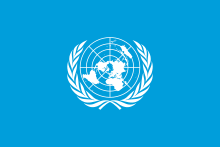
World government is the concept of a government that would legislate, enforce and interpret international law, on a level above that of national government. While there are no governments that have such power yet, the United Nations and the International Criminal Court are often seen as steps toward a world government. The Concept of a world government goes back to at least the Greek and Roman times, as a method to preserve peace.
Law
Main article: International law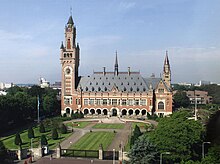
International law is defined as law that regulates the activities of entities possessing international personality; this is usually taken to mean the interactions between nations, however has recently expanded to include the actions of international organizations and multinational corporations. The principle regulator of modern international law is the International Court of Justice.
Politics
Main articles: War, Peace, and International relationsOne could consider that there exist two major relations between nations: war and peace.
Warfare is the greatest affair of state, the basis of life and death. The Tao to survival or extinction, it must be thoroughly pondered and analyzed.
— The Art of War by Sun Tzu
War is a conflict involving the organized use of weapons and physical force by states or other large-scale groups. Warring parties usually hold territory, which they can win or lose; and each has a leading person or organization, which can surrender, or collapse, thus ending the war. Until the end of World War II, participants usually issued formal declarations of war.
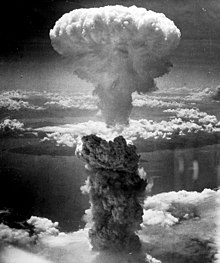
War seems as old as human society, and certainly features prominently in the recorded histories of state-cultures. In tribal societies engaging in endemic warfare, it is typical for the tribes armed force to consist entirely or mostly of militia or a warrior caste. The earliest city states and empires in Mesopotamia became the first to employ standing armies. Organization and structure has since been central to warfare, as illustrated by the success of highly disciplined troops of the Roman Empire.
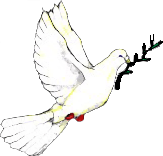
An opposite to war is peace. A simple and narrow definition of peace entails the absence of war. (The ancient Romans defined peace, Pax, as Absentia Belli, the absence of war.)
The maintenance of longstanding peace between nations ranks among the few great successes of the United Nations. Peace can be voluntary, where potential agitators choose to abstain from disturbance, or it can be enforced, by suppressing those who might otherwise cause such disturbance. Since 1945, the world has only been 26 days without war.
International relations (IR), a branch of political science, is the study of foreign affairs of and relations among states within the international system, including the roles of states, inter-governmental organizations (IGOs), non-governmental organizations (NGOs), and multinational corporations (MNCs). It is both an academic and public policy field, and can be either positive or normative as it both seeks to analyze as well as formulate foreign policy.
Geography and climate
Main articles: Global climate and GeographyThe climate of the world is highly varied; temperatures range from -88°C to 58°C. There are nine different divisions of climate that exist on Earth, allowing for amazing biodiversity. It has also been theorized that different cultures have developed as a result of varying climate. Geography is also highly varied; there are many different types of landforms, that range in elevation from 8,848m above sea level to 10,900m below sea level. World maps of the surface of the Earth are made to visualize the climatological and geographical features of the earth.
Economy
Main articles: World economy, Global economy, and GlobalizationIn recent years, larger corporations have begun to globalize. This movement has been a source of debate as there are those who oppose this.
Demographics
Main article: World population
The population of the world is estimated to have reached 6.5 billion, as of 25 February, 2006. The following chart shows predictions of its growth until 2050.
| Year | Population (billions) |
|---|---|
| 2006 | 6.5 |
| 2010 | 6.8 |
| 2020 | 7.6 |
| 2030 | 8.2 |
| 2040 | 8.7 |
| 2050 | 8.9 |
Many predict that if population growth at this rate continues, there will be a Malthusian catastrophe.
Language
Main articles: Lingua franca and International auxiliary languageWhile there are no official world languages, English has (according to many) become the most common lingua franca, superceding French as the most common diplomatic language, and spreading via electronic media. English, French, Spanish, Arabic, Chinese, and Russian are the United Nations' official languages, and all could be considered world languages, although with the demise of the USSR, use of Russian has greatly declined and its status as a world language is doubtful.
Culture
Main articles: Culture and CivilizationThe word civilization (or civilisation) has a variety of meanings related to human society. The word "civilization" comes from the Latin word for townsman or citizen, civis, and its adjectival form, civilis. To be "civilized" essentially meant being a townsman, governed by the constitution and legal statutes of that community. Roman civil law was gathered together into a consolidated body of the “Corpus Juris Civilis” in the 6th Century for Emperor Justinian (483-565 CE). Justinian's code was rediscovered and used by law professors at the first University established in Western Europe, at Bologna in the 11th century. From 1388 the word “civil” appeared in English, while “civilization” as a “law which makes a criminal process civil”, appeared in 1704, closely followed in 1722 with “civilization” - meaning the opposite of “barbarity” and coming probably from the French language.
See also
References
- Sapolsky, Robert. "Are The Desert People Winning." Discover. 26 (2005).